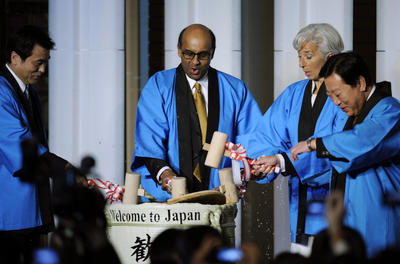The Fukushima nuclear disaster forcefully raised issues of safety, energy policy, public utility company behaviour, and government regulation and policy making. While its energy conservation and initial recovery were impressive, Japan is yet to fully confront some key questions: should additional existing nuclear plants be reopened to overcome potential power shortfalls and to reduce costs? How far and how quickly should nuclear power downsizing proceed? Will power companies eventually be allowed to reopen and operate most nuclear plants until they reach their normal 40-year lifetime? A decision not to reopen nuclear plants would make four of Japan’s ten electric power companies insolvent.
Japanese structural issues are yet to be resolved. Inadequate domestic demand, huge government budget deficits, immense government debt as a share of GDP, small but persistent deflation, unemployment and underemployment of young Japanese, and an uncompetitive agriculture sector — all these issues must be addressed in the medium to long term.
Still, there have been some good signs.
First, on 14 February 2012, the Bank of Japan announced it was setting a goal (if not an explicit target) of a 1 per cent annual increase in the CPI, which would bring deflation to an end.
Second, Prime Minister Noda has indicated that Japan will join the Trans-Pacific Partnership (TPP) negotiations. Joining the TPP will force Japan to carry out much-needed structural and institutional deregulation and liberalisation, but it is far from a sure thing. Agriculture’s political resistance has been the stumbling block for years, preventing Japan from embarking on any significant trade liberalisation agreements.
Third, Prime Minister Noda made fiscal consolidation his top priority. In August the House of Councillors (the Japanese parliament’s upper house) passed legislation increasing the consumption tax, which is currently 5 per cent to 8 per cent in October 2014 and to 10 per cent in April 2015. But the legislation has an escape clause: the Cabinet can decide not to implement the consumption tax increase if it judges economic conditions to be ‘adverse’.
Reform of the consumption tax came at a political cost for Noda. He only succeeded in obtaining opposition support in the upper house because he agreed to calling a lower house election ‘soon’, before the August 2013 regular schedule.
The election brings with it considerable uncertainty. Noda’s party, the Democratic Party of Japan, will suffer substantial losses. The Liberal Democratic Party will increase its seats but is unlikely to achieve a majority. The key question is how Toru Hashimoto’s new political party, Nihon Ishin no Kai (Japan Restoration Party), established on 9 September 2012, will do. Hashimoto, the popular, young Osaka mayor and former Osaka prefecture governor, is rather conservative and nationalistic. He is a proponent of decentralisation and deregulation, has assembled a brain trust of well-known, capable reformers, has been developing a policy platform, and reportedly plans to run some 250 candidates for the 480 lower house positions.
With management having autonomous control of most listed Japanese companies, corporate governance in Japan is weak. Insider trading is widespread, and some Japanese financial institutions are deeply involved. Quite apart from corruption scandals at Olympus, Daio Paper, TEPCO and AIJ Investment Advisors, Japanese financial institutions may be deeply complicit in the manipulation of Libor and other benchmark interest rates.
The new government will have to address this issue, as well as energy policy, the role of nuclear power, slow economic growth, fiscal consolidation, deflation and weak labour markets. There are no real indications that it will be able to do so effectively. Economic revitalisation and creation of domestic demand requires comprehensive and deep economic deregulation and liberalisation. Japanese policy makers, even in a new government, are unlikely to have the political will to carry out a major fiscal and monetary macroeconomic policy package unless a government bond market crisis occurs.
Japan is a clean, comfortable, enjoyable place to live. Many Japanese are inward-looking. It is a comfortable, easy, enjoyable environment, and the domestic market is large. Japanese do not really want isolation, but many see benefits in being an insular nation with a distinctive language and culture. Japanese scores on TOEFL (the test of English as a foreign language) are lower not only than those of students in South Korea and China, but lower than in 24 other Asian countries.
Dynamic catch-up growth was completed more than two decades ago, and Japan’s political economy has muddled along since. There is a tendency in the West to not pay much attention to Japan, which is simply recognised as an advanced industrial economy, albeit one with many problems.
So the short-term future of the Japanese economy provides little cause for optimism because economic policy gridlock and inaction are likely to continue. But, in the long term, ignoring Japan is a big mistake. Japan will continue to be a technological leader, and a major global economic partner and competitor in the foreseeable future. Japan has a record of being a strong, highly motivated, effective society, demonstrably capable of responding well to and overcoming adversity. Despite the political turmoil, the structural issues, and the pressing energy questions, it can do so again.
Hugh Patrick is Director of the Center on Japanese Economy and Business and Emeritus Professor of International Business at Columbia University.

